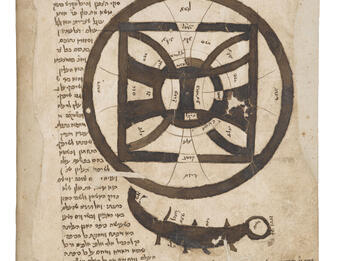Hanhagot ve-tikunim (Conduct and Regulations)
These are the words of the covenant [see, e.g., Deuteronomy 28:69], the twenty-four enactments that the people of action of the holy society, which is in the holy city of Safed, may it be built and established quickly and in our time, sent to every holy community outside the land of Israel. They wrote these to them so that they would act in accordance with their deeds, and so that they might glorify their Creator and cleave unto the Lord, may He be blessed. And each and every person shall gird his loins in order to follow their deeds and all of their words, and to love truth and peace (Zechariah 8:19), and they will merit life in the world-to-come.
1. To swear no oath, not even concerning the truth.
2. Not to get angry at all and not to act at all by way of revenge or holding a grudge.
3. Never to express any falsehood intentionally.
4. To join each and every day to a fellow God-fearing partner.
5. To fast on Thursdays and to read the afternoon prayers in a synagogue with a quorum of ten fasters.
6. To pray the afternoon prayer Friday afternoon, each and every watch in its place, and to go from there to welcome the Sabbath Bride.
7. To repair [tikkun] by praying with the proper intention during the first three blessings of the evening, morning, and afternoon Amidah.
8. To pray the afternoon prayer service with a prayer shawl and phylacteries.
9. Neither to eat any type of meat nor to drink wine on Sundays, because the Temple was destroyed by it [i.e., gluttony].
10. To lament over the destruction of the Temple in one’s house with the lamentation, “I will weep.”1
11. Only to feast when it is celebrating the performance of a commandment, that is to say, the feast of a brit milah, or weddings of scholars with the daughters of scholars.
12. To recite at every feast: “By the waters of Babylon” (Psalm 37) in remembrance of the destruction [of the Temple].
13. To be careful to refrain from foolishness, slander, and worthless things.
14. To be careful in every place not to engage in any worthless conversation.
15. Not to speak in the synagogue from the time of the beginning of prayer until the titkabel kaddish is recited, and to read each and every word from the Torah scroll in awe and fear, as if one had received it [at that moment] from Mount Sinai.
16. To have the proper intention at least for the verses of “Shema‘ Yisrael” and [the subsequent refrain]: “Blessed be the name of His glorious Kingdom for ever and ever.”
17. Not to let one day pass without having given charity, at the very least one cent [pruta] every day.
18. Not to look at women, as much as possible, or even their garments.
19. Not to delay more than one month in paying off a pledge or a contribution, and the best is to give before one promises.
20. Not to say the Sheheḥiyanu blessing between the seventeenth of Tammuz and the ninth of Av.
21. To confess before eating and before sleeping.
22. To not eat meat between the seventeenth of Tammuz and the ninth of Av, except for this or that.2
23. To speak with members of the community during the weekday in the Holy Tongue, and on the Sabbath with everyone who keeps the Torah, on the condition that no stranger is present [i.e., one who is not a member of the community that acts according to these rules].
24. One who has intentionally transgressed any of these things should acknowledge that he has sinned on the eve of Rosh ḥodesh, in front of the pious, or most of them; and everyone who upholds [these amendments] and does them is promised the world-to-come, although he should do them out of complete love.
Notes
[The citation for this lamentation is unclear.—Trans.]
[It is unclear what the last part “except for this or that” is referring to.—Trans.]
Credits
Published in: The Posen Library of Jewish Culture and Civilization, vol. 5.



